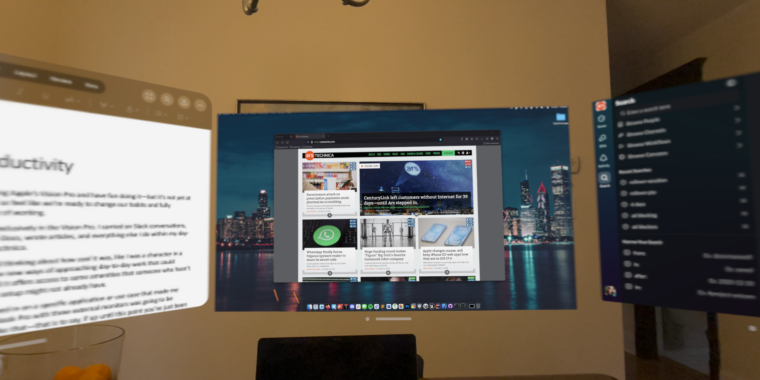The author seemed to have no trouble wearing it for so long, but I think it would be incredibly uncomfortable after a short while for the majority of users. Wearing my super-light eyeglasses all day every day is eventually uncomfortable for me. I looove taking my glasses off before bed, it’s such a relief, so I can’t imagine adding all that extra weight when I’ve got two perfectly functional monitors in front of me.
And I’m totally in favor of AR/VR/MR or whatever, it just has to be insanely light and comfortable if I’m expected to wear it for more than 30 minutes at a time.
While you’re not wrong overall, eyeglasses do specifically put weight on the bridge of your nose, which sucks. Properly fitted, the weight of a headset should be carried by your forehead, the base of your skull, and other broader and more robust bones.
A pair of glasses should be a tiny fraction of the weight of the headset though.
I believe glasses weigh around 10-50 grams and the headset is 600 grams
Sure, but you’re comparing apples to oranges. It’s like saying your shoes are super comfortable when we’re talking about how much our knees hurt. 50 grams on your forehead is nothing.
Like I said, the person is right overall, I’m just trying to direct the conversation to the appropriate domain.
Sony pretty much nailed it on their first try with PSVR.
And I’m totally in favor of AR/VR/MR or whatever, it just has to be insanely light and comfortable
Where tf are my smart contact lenses, I was promised by various scifi shows and books that I would have smart contacts by now 😡
Did you miss the Sci fi shows that taught us that we have to let the tech tycoons enjoy new technology exclusively for a good decade or so before it can be sold to the masses? So your smart contacts are probably in Tim Cook or Satya Nadella’s secret lab in a mountain valley.
They’ll be distributed to you when you finally get to pick up your flying car.
Excuse my French but fuck Apple and fuck their closed ecosystem. I will never buy any of their products.
If some company releases an alternative working on different OSes and based on open standards I will be all in, but I refuse to make a multi trillion company richer.
Good to know. Thank you for sharing.
So you want a product made by some of the world’s most talented engineers and designers, costing untold millions for dollars in R&D, but it should not be made by a corporation? How does that work?
I want a product that I don’t need to use exclusively with MacOS and the moment I want to switch to Linux or Windows to become a paper weight.
Apple is notorious for not porting their products to other platforms, and using closed standards.
If you are okay with that I am not!
It’s Vision OS, not MacOS. You can already install Linux on a Mac, as well as any ARM compatible OS through virtualization:
“Apple allows booting unsigned/custom kernels on Apple Silicon Macs without a jailbreak! This isn’t a hack or an omission, but an actual feature that Apple built into these devices”
What do you think would happen if you tried to install Linux or Windows on a Vision Pro? Assuming Apple was to open up the device, what would that look like?
This is the best summary I could come up with:
I carried on Slack conversations, dialed into Zoom video calls, edited Google Docs, wrote articles, and did everything else I do within my day-to-day responsibilities as an editor at Ars Technica.
At the same time, though, I never quite zeroed in on a specific application or use case that made me think my normal habit of working on a MacBook Pro with three external monitors would be replaced.
If you don’t already have a setup like that—that is to say, if you’ve just been working on a laptop on its own—then the Vision Pro can add a lot of value.
I plan to explore more use cases in the future, like gaming, but this is the last major piece in a series of sub-reviews of the Vision Pro that I’ve done on various applications, like entertainment or as an on-the-go mobile device.
It’s cool, and the ability to shift between your real environment and fully immersive virtual ones can help with focus, especially if you do intensive creative work like writing.
Clicking is done by simply tapping two of your fingers together almost anywhere around your body; the headset has cameras all over, so you don’t have to hold your hands up or in front of you to do this.
The original article contains 520 words, the summary contains 210 words. Saved 60%. I’m a bot and I’m open source!







